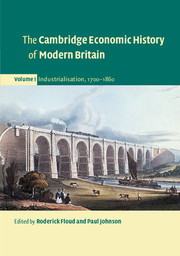Book contents
- Frontmatter
- Chapter1 Accounting for the Industrial Revolution
- Chapter2 Industrial organisation and structure
- Chapter3 British population during the ‘long’ eighteenth century, 1680–1840
- Chapter4 Agriculture during the industrial revolution, 1700–1850
- Chapter5 Industrialisation and technological change
- Chapter6 Money, finance and capital markets
- Chapter7 Trade: discovery, mercantilism and technology
- Chapter8 Government and the economy, 1688–1850
- Chapter9 Household economy
- Chapter10 Living standards and the urban environment
- Chapter11 Transport
- Chapter12 Education and skill of the British labour force
- Chapter13 Consumption in eighteenth- and early nineteenth-century Britain
- Chapter14 Scotland
- Chapter15 The extractive industries
- Chapter16 The industrial revolution in global perspective
- Bibliography
- Index
Chapter9 - Household economy
Published online by Cambridge University Press: 28 March 2008
- Frontmatter
- Chapter1 Accounting for the Industrial Revolution
- Chapter2 Industrial organisation and structure
- Chapter3 British population during the ‘long’ eighteenth century, 1680–1840
- Chapter4 Agriculture during the industrial revolution, 1700–1850
- Chapter5 Industrialisation and technological change
- Chapter6 Money, finance and capital markets
- Chapter7 Trade: discovery, mercantilism and technology
- Chapter8 Government and the economy, 1688–1850
- Chapter9 Household economy
- Chapter10 Living standards and the urban environment
- Chapter11 Transport
- Chapter12 Education and skill of the British labour force
- Chapter13 Consumption in eighteenth- and early nineteenth-century Britain
- Chapter14 Scotland
- Chapter15 The extractive industries
- Chapter16 The industrial revolution in global perspective
- Bibliography
- Index
Summary
INTRODUCTION
In many times and places, household and economy were overlapping institutions. Indeed, the word economics comes from the Greek oeconomica, meaning the science or art of managing a household. The traditional household brimmed with economic activities. Based on kin but extended to include living-in servants, apprentices and lodgers, it was the scene of production as well as consumption and reproduction. Allocation of labour and resources was not egalitarian, but all members participated. In contrast its modern counterpart has suffered a dramatic ‘loss of function’. Needs that were formerly met by family members working within the home are now met by outside agencies, and individuals interact with the wider economy and society not through their households but independently. The household has wasted economically, shrunk in apparent size and become dependent on the earnings of its male head, or very recently its two adult earners (Parsons 1959).
The contrast between pre-industrial and modern families implicates economic change in the household’s loss of function. Urban industrial life not only involved significant changes in how goods and services were produced but also reallocated the transformed activities between the household and the market economy. This chapter is about these processes as they occurred for the first time in the context of another pioneer experience, industrialisation in Britain in the eighteenth and nineteenth centuries: ‘ours was the society which first ventured into the industrial era, and English men and women were the first who had to try to find a home for themselves in a world where the working family, the producing household, seemed to have no place’ (Laslett 1965: 18).
- Type
- Chapter
- Information
- The Cambridge Economic History of Modern Britain , pp. 238 - 267Publisher: Cambridge University PressPrint publication year: 2004
- 3
- Cited by



